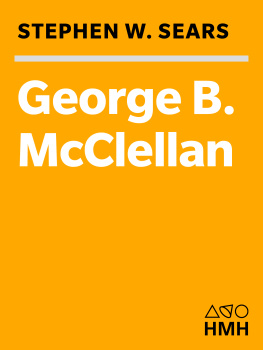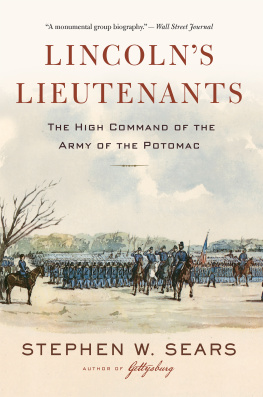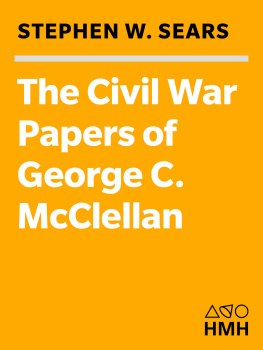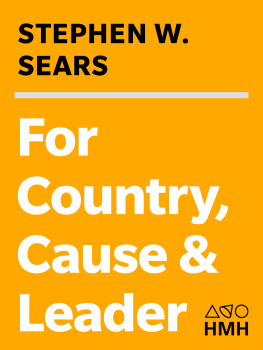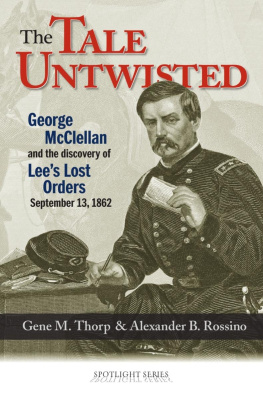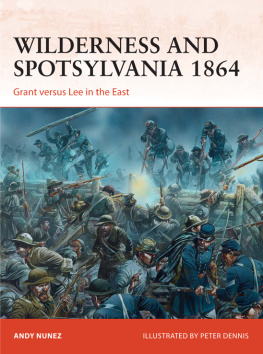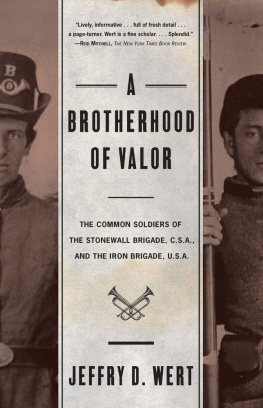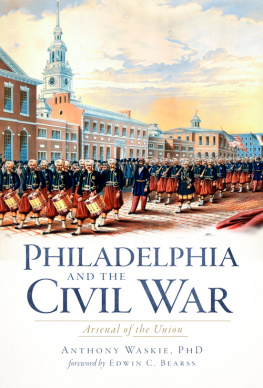Copyright 1988 by Stephen W. Sears
ALL RIGHTS RESERVED
For information about permission to reproduce selections from this book, write to Permissions, Houghton Mifflin Harcourt Publishing Company, 215 Park Avenue South, New York, New York 10003.
www.hmhco.com
The Library of Congress has cataloged the print edition as follows:
Sears, Stephen W.
George B. McClellan: the young Napoleon.
Bibliography: p.
Includes index.
1. McClellan, George Brinton, 18261885. 2. GeneralsUnited StatesBiography. 3. United States. ArmyBiography. 4. United StatesHistoryCivil War, 18611865Campaigns. I. Title.
E467.1.M2S43 1988 973.7'3'0924 882138
ISBN 0-89919-264-5
e ISBN 978-0-544-39122-2
v1.1214
Maps by Marsh Communications
BOMC offers recordings and compact discs, cassettes and records. For information and catalog write to BOMR, Camp Hill, PA 17012.
In memory of Robert S. Fletcher
MAPS
Western Virginia Theater
Eastern Virginia Theater
The Richmond Battlefields
The Maryland Theater
The Antietam Battlefield
INTRODUCTION
W HEN MAKING WAR , General George Brinton McClellan was a man possessed by demons and delusions. He believed beyond any doubt that his Confederate enemies faced him with forces substantially greater than his own. He believed with equal conviction that enemies at the head of his own government conspired to see him and his army defeated so as to carry out their traitorous purposes. He believed himself to be Gods chosen instrument for saving the Union. When he lost the courage to fight, as he did in every battle, he believed he was preserving his army to fight the next time on another and better day. Throughout the Civil War he labored under a burden of controversy as heavy as Pilgrims bundle. While he basked in the appellation given him by his admirersthe Young Napoleonhe was called by a legion of derisive opponents Young McNapoleon.
General McClellan was seldom out of the public eye during the war years. At the age of thirty-four he was named commander of the Norths largest army, and then commander of all the Northern armies. At thirty-five he fought the longest and largest campaign of the time, and then the bloodiest single day of battle in the nations history. At thirty-seven he ran for the presidency against Abraham Lincoln, and it required an act of political suicide by his party to ensure that he would not win. However all these actions may be judged for good or ill, George McClellans importance in shaping the course of the Union during the Civil War was matched only by that of President Lincoln and Generals Grant and Sherman.
Few of those who commented on General McClellan, in his day and afterward, have been neutral toward him, and as a consequence their interpretations of his actions, even their recital of the facts of his life, have varied widely. As is true of any life so filled with contradiction and controversy, an understanding of the man is best found in original, primary sources, and this biography is drawn entirely from such sources.
They are a remarkably rich and varied lotin many instances previously untappedand they cast new light on old contentions. McClellan was said, for example, despite all his faults to have been the best commander the Army of the Potomac ever had, yet on the evidence he was inarguably the worst. The record is equally clear that it was his own decisions, rather than those of the government, that doomed his grand campaign to end the war. Contemporaries charged him with being secretly in sympathy with the secessionists, but in truth there was no one who was more loyal and patriotic. He has been portrayed as a political innocent caught up in the schemes of party, when in fact he was a partisan Democrat in knowing and deliberate opposition to the Republican administration that employed him.
The historian James Ford Rhodes once wrote that no man can go unscathed if his acts are interpreted by his innermost thoughts. However true that may be, history can be grateful that in George McClellans case it is these innermost thoughts, so well expressed in the full record of his letters and other writings, that finally reveal the measure of the man. If that measure is not how he himself believed history would judge him, it is representative of yet one more of his delusions.
ONE
THE MAKING OF A SOLDIER
C ONDITIONAL CADET McClellan was disheartened by everything about his first two weeks at West Point except the spectacular setting. He was desperately homesick and his feet hurt from drilling in shoes that were too tight, and he was nearly ready to pack up and return to Philadelphia. I am as much alone as if in a boat in the middle of the Atlantic, not a soul here cares for, or thinks of menot one here would lift a finger to help me, he wrote his sister Frederica. I am entirely dependent on myself... & take the blame of all my mistakes.... He had to put his letter aside to answer the drill call, but when he returned he was rejuvenated; with new shoes his awkwardness disappeared and he outdid everyone. You cant imagine how much more inspirited I feel since I have acquitted myself handsomely at this mornings drill, he told Frederica. He was sure now that he could do his duty as well as anyone who ever did go through here. George Brinton McClellan would rarely lack confidence in his soldierly abilities, and this first experience of doubt was typically brief.
His homesickness may be accounted for by his age. At just over fifteen and a half, he was the youngest of those who arrived at West Point in June 1842 to seek places as fourth classmen in the Military Academy. His confidence grew when he passed the physical examinationthirty of his potential classmates failed, he notedand then the entrance examination. One hurdle remained, but his promise was such that in his case the authorities waived the minimum entry age of sixteen. On July 1 he was admitted to the class of 1846.
In a brief sketch of his boyhood, written late in life, George McClellan traced his interest in West Point back to the age of ten, when a fellow student at a private school in Philadelphia, Alfred Sully, son of the prominent painter Thomas Sully, had received an Academy appointment. There was an ancestral military background of sortsthe Mclellans of Scotland fought in support of the Stuart kingsbut the only American McClellan of direct ancestry to take up arms before young George was his great-grandfather, Samuel McClellan, of Woodstock, Connecticut. Samuel served in the militia in the French and Indian War, and shortly before the Revolution raised a troop of horse at Woodstock. A family tradition of dubious authority placed him in the Battle of Bunker Hill. At any event, he served in the local militia for the remainder of the Revolution. Although not called to action during any of the British raids on Connecticut, he was a capable enough administrator to rise in rank to brigadier general of militia by 1779. He was married to a descendant of Governor William Bradford of Plymouth Colony, lived out his life much honored and respected, and was known to his posterity, including his great-grandson, as General Sam.
The succeeding generation remained in Woodstock, where General Sams sons James and John founded the Woodstock Academy. The sons of James McClellan, George and Samuel, made their careers in medicine and sought a wider world. George, the father of Cadet McClellan, graduated from Yale College in 1816 and earned his medical degree from the University of Pennsylvania three years later. He set up a surgical practice in Philadelphia, specializing in ophthalmology. A man of great energy, he founded the Jefferson Medical College and headed its faculty, maintained a substantial practice, edited a medical journal, wrote on the principles and practice of surgery, and kept a stable of fast trotters.
Next page
